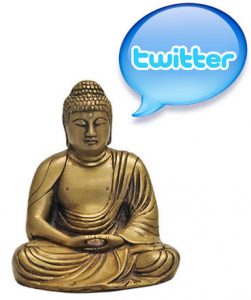Assume you are in a social gathering at a friend’s place. You offer an opinion on BJP’s prospects in the forthcoming elections. A few friends debate it out with you while one particular guy seems more annoyed than others. He goes on to abuse you for your opinion.
What would you do? Stay on and abuse him back (given your political leanings)? Or move away from that man and get on with your life? I’d do the latter, since it is obvious.
This wouldn’t make me blame the act of socializing at a friend’s place.
 I have no idea why Sachin Kalbag, executive editor of Mid Day chose to persist with the negativity on Twitter for so long, as he describes .
I have no idea why Sachin Kalbag, executive editor of Mid Day chose to persist with the negativity on Twitter for so long, as he describes .
The troll behavior, the negativity and the abuse lives on, either on Twitter, or offline, or in any other online platforms because they are fed and nurtured. They will continue to haunt people and go after individuals – the only thing that can stop them is you.
So, stop worrying about how to stop them and focus on how you need not and should not hear them.
There is a fascinating premise in Ernest Cline’s sci-fi novel, . The book involves a simulated (virtual) world called OASIS, set in a dystopian future. Because of all the energy and environmental crisis, most business in 2045, including schooling system, is conducted online, in OASIS. The novel’s protagonist is a young boy and he likes the power to mute his detractors in the OASIS. At one point, he says,
The ability to mute my peers was one of my favorite things about attending school online, and I took advantage of it almost daily. The best thing about it was that they could see that you?d muted them, and they couldn?t do a damn thing about it. There was never any fighting on school grounds. The simulation simply didn?t allow it. The entire planet of Ludus was a no-PvP zone, meaning that no player-versus-player combat was permitted. At this school, the only real weapons were words, so I?d become skilled at wielding them.
That’s precisely how Twitter, or any online medium works too. If you, as an individual, do not like something, move away from it – after all, that’s what we’d do offline too, right?
The problem is compounded on 2 levels, online, however.
One, the fact that every thought of yours is available to the entire world, and not just your immediate peer set. That would attract trolls and attackers from anywhere and more so, people you don’t know at all.
Let’s consider how you’d address this in the real world.
You are in the supermarket. You notice a friend and start talking to him, while buying stuff. You make a point and he responds and the debate goes on, smoothly. Suddenly, a new person comes to the scene and says, ‘Sorry, I couldn’t help overhearing you. But I don’t agree with you on that at all!’.
Your first reaction? Mine would be, ‘Excuse me? And you are?’
Online, on Twitter, the equivalent is checking out the intruder’s profile (bio) and a quick glimpse of his/her past 10-20 tweets. I have found that this is a fairly good yardstick to know whether it is worth responding to or not. If the person seems largely sane, I revert. Else, I completely ignore that person.
The second problem is that of perceived anonymity. In the real world, barring the truly adventurous and powerful, very few would venture out with abuse and negativity with a stranger. Why? Simple – the prospect of physical injury.
Online? There is no prospect of physical injury. So, the incentive to let your detractors really have it is a LOT more. What’s the worst thing that can happen? At best the other party would stop listening to you (unfollow you/block you). That does not hurt, physically. So, trolls and abusers can flourish and move to a new target.
The point of all this is simple. Twitter is nothing but a virtual platform that mirrors the one offline. If you are hurt by negativity or abuse, it simply means you allow yourself to be hurt – by reading them and perhaps responding to them. Twitter need not be a war zone. It becomes a war zone if we, the people, allow it to. It can be an ideas forum, if we, the people – again – allow it to be one. Like in a democracy – only with more power and precision – Twitter is something that is entirely in the control of the user. Follow the right people (after checking their background), converse with the right people and ignore those that you feel don’t match up to your level of intellect and interests. Simple, right?
I’m glad Sachin had this epiphany at least now. Late, but better late than never.
Image courtesy: Giraffecomms.
